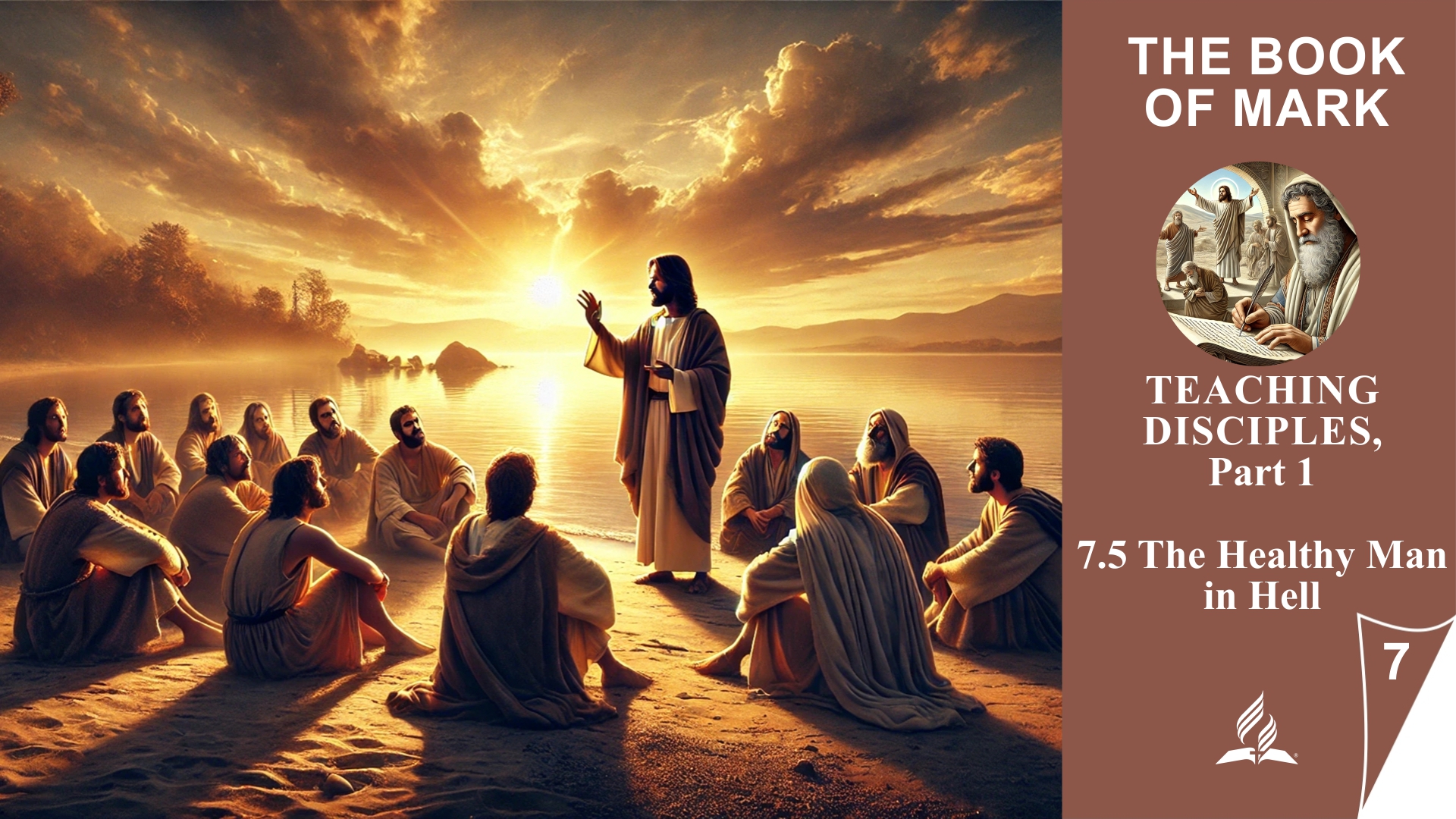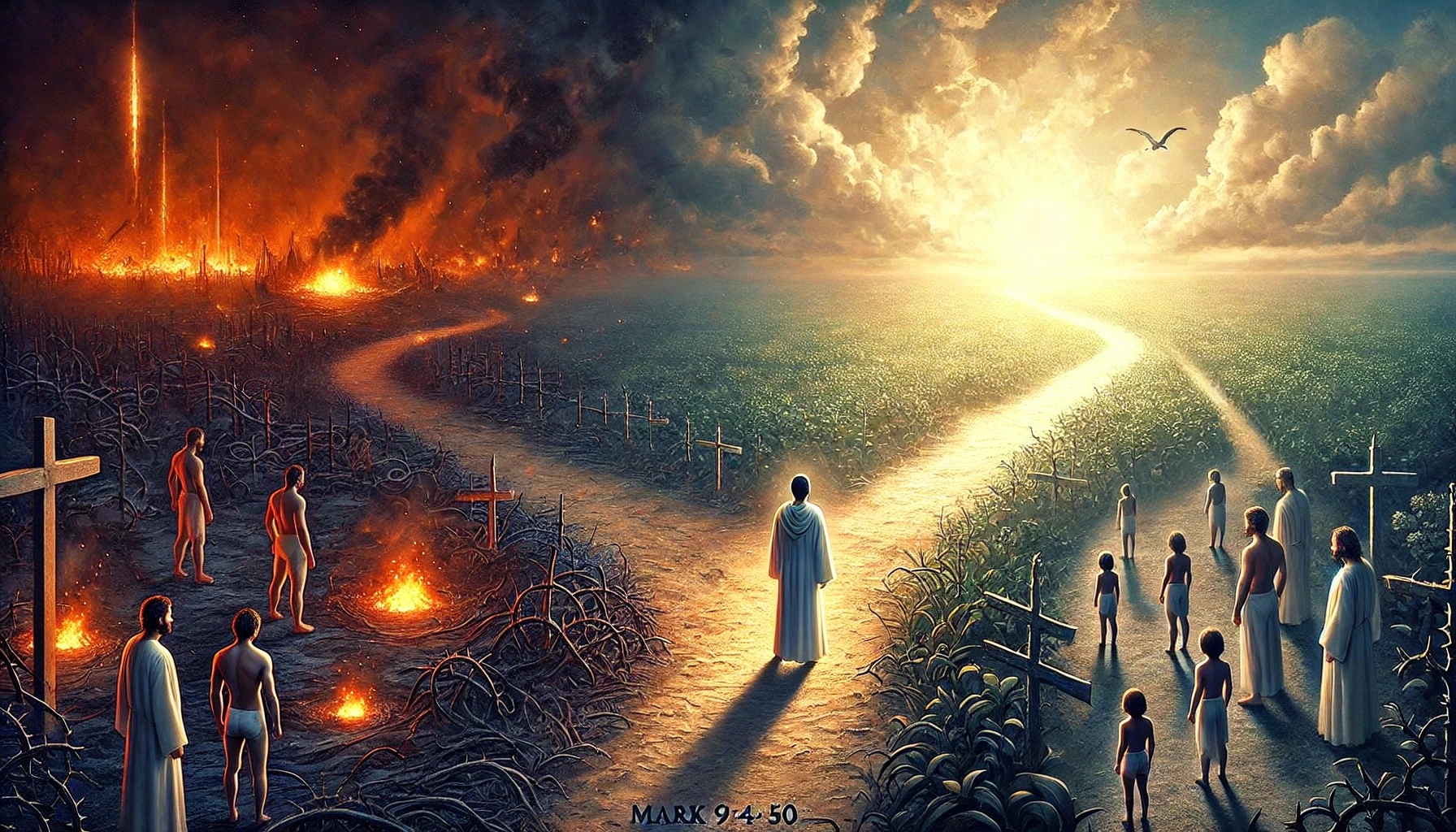


7.5 The Healthy Man in Hell
The Radical Urgency of Avoiding Sin
Read Mark 9:42–50. What do the teachings of Jesus in this passage have in common?
At first glance, Mark 9:42–50 might seem like a collection of loosely connected teachings, but a closer examination reveals a clear thematic link. Jesus uses key terms such as “causes of sin,” “fire,” and “salt” to convey a profound and continuous lesson.
Firstly, Jesus addresses the responsibility toward the “little ones,” referring to new or vulnerable believers. He emphasizes the importance of protecting them from sin by presenting a dramatic scenario: it would be better to be drowned in the sea than to cause one of these little ones to stumble. This exaggeration underscores the seriousness of this responsibility.
Following this, Jesus uses another form of hyperbole to illustrate the gravity of sin. The command to cut off a hand, foot, or eye is not to be taken literally but serves to highlight the absolute necessity of avoiding anything that leads to sin. This demonstrates how dangerous and destructive sin can be.
The concept of hell, as Jesus describes it, is also significant. He doesn’t refer to an eternally burning hell but uses images of fire and punishment to illustrate the final and irreversible nature of being lost. The notion of a “healthy person in hell” is an absurd exaggeration designed to emphasize the urgency of addressing sin.
Overall, this passage teaches a profound seriousness about dealing with sin and the great responsibility we have toward others, especially the weakest believers. The consequences of sin are grave, and Jesus calls for a radical attitude toward anything that tempts us.
The teachings of Jesus in Mark 9:42–50 have direct and profound implications for our daily lives and faith. The radical urgency Jesus emphasizes regarding the avoidance of sin challenges us to examine our own lives and decisions closely.
-
Responsibility to Others: Jesus speaks about the importance of protecting the “little ones,” those who are weak or new in the faith. In everyday life, this means we have a special responsibility for our behavior and the influence we exert on others. Our words, actions, and example can either strengthen others in their faith or cause them to stumble. This teaching calls us to be mindful of our responsibility and to handle others, particularly those susceptible to doubts and temptations, with sensitivity and care.
-
Radical Rejection of Sin: The drastic language of cutting off a hand or plucking out an eye is meant to make us recognize the seriousness of sin. In our daily lives, this might mean actively distancing ourselves from anything that tempts us or pulls us away from God. This can include avoiding certain places, correcting bad habits, or rethinking friendships that lead us astray. It’s about being consistent and setting priorities that foster our spiritual growth.
-
Understanding the Consequences: The idea of eternal hell may seem frightening, but Jesus uses this imagery to highlight the irreversibility of sin and its consequences. For our faith, this means we need to be aware of the seriousness of our lifestyle. It’s not just about avoiding sin but actively striving for holiness and righteousness. We should consider the long-term consequences of our decisions and remember that our earthly life is preparation for eternal life.
-
Salt and Fire in Daily Life: Jesus also speaks of “salt” losing its saltiness and “fire” that purifies. These images remind us that our faith must remain alive and impactful. We are called to be the “salt of the earth,” making a positive difference, and to allow ourselves to be refined through “fire”—symbolic of trials and challenges—to grow in our faith.
In summary, this passage urges us to lead our lives with seriousness and purpose. Sin is not trivial, and our responsibility to God and others is significant. By integrating these teachings into our daily lives, we can strengthen our own spiritual journey and become a shining example for others.
It is better to enter heaven with a wound than to be healthy and end up in hell.
Visited 45 times, 1 visit(s) today








